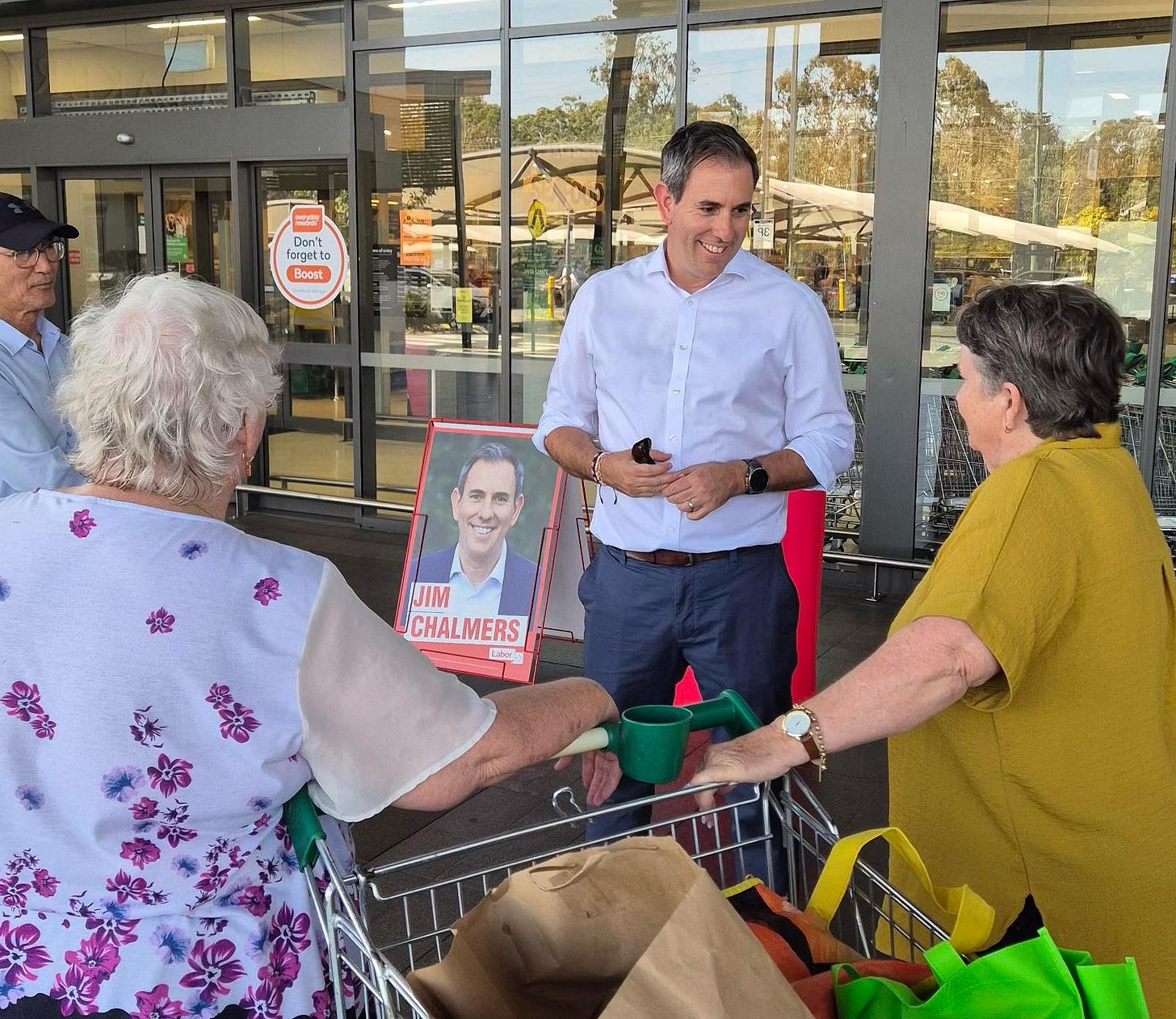Treasurer Defends Superannuation Policy Shift After Two-Year Consultation, Confirms Prime Ministerial Agreement
This piece is freely available to read. Become a paid subscriber today and help keep Mencari News financially afloat so that we can continue to pay our writers for their insight and expertise.
Today’s Article is brought to you by Empower your podcasting vision with a suite of creative solutions at your fingertips.
Treasurer Jim Chalmers pushed back against characterizations of a policy retreat Monday after unveiling substantial modifications to the government’s superannuation taxation proposal, insisting the changes represent “another way to satisfy the same objectives” following more than two years of stakeholder feedback and negotiations that he confirmed involved direct discussions with Prime Minister Anthony Albanese.
The Member for Rankin in Queensland faced pointed questions from reporters at Monday’s press conference about the extensive changes to superannuation tax policy first announced in early 2023, with journalists characterizing the modifications as a “retreat” that addressed “every single point” of criticism leveled at the original proposal.
“Do you concede you’ve got it wrong?” one reporter asked directly, according to a transcript of the press conference.
Chalmers rejected that framing while acknowledging the government had modified its approach substantially based on feedback from the superannuation industry, economic experts, and parliamentary negotiations.
“First of all, when it comes to the feedback that we’ve had for more than two years now, the objective there has been to separate the genuine feedback from the usual kind of predictable partisan feedback that you get from time to time,” Chalmers responded.
Truth matters. Quality journalism costs.
Your subscription to Mencari directly funds the investigative reporting our democracy needs. For less than a coffee per week, you enable our journalists to uncover stories that powerful interests would rather keep hidden. There is no corporate influence involved. No compromises. Just honest journalism when we need it most.
Not ready to be paid subscribe, but appreciate the newsletter ? Grab us a beer or snag the exclusive ad spot at the top of next week's newsletter.
Prime Minister’s Role Confirmed
When pressed specifically about whether he or Prime Minister Albanese made the final decision on the policy changes, Chalmers confirmed joint leadership of the process.
“The Prime Minister and I agreed these changes and I recommended them to the Expenditure Review Committee of Cabinet on Friday afternoon and to the Cabinet this morning and they were agreed,” the Treasurer stated.
This confirmation followed questions raised during Senate estimates hearings the previous week about meetings involving the Prime Minister’s office regarding the superannuation policy. Chalmers addressed those queries directly in his Monday remarks.
“I think as I said last week when I was asked about the meetings with the Prime Minister’s office it’s not unusual at all for us to facilitate briefings with other officers,” Chalmers said, noting that his office attended those discussions.
Timeline of Policy Evolution
The original superannuation tax proposal announced in early 2023 would have imposed a 30 percent tax rate on earnings from balances exceeding $3 million, calculated based on unrealized capital gains, with no indexation of the threshold and a planned mid-2025 implementation date.
Monday’s revised package introduced multiple significant modifications: a second threshold at $10 million with a 40 percent rate, calculation based on realized rather than unrealized gains, indexation of both thresholds to the transfer balance cap, and a one-year implementation delay to July 1, 2026.
When reporters noted these criticisms were “not particularly new” and asked “why now?” regarding the timing of the changes, Chalmers emphasized the government’s deliberative approach.
“We’ve taken our time to work through the issues,” the Treasurer said. “We didn’t react quickly to every editorial or every criticism from every quarter. We’ve taken the time to work through the issues.”
Asked more directly how long he had been working on the revised approach, Chalmers responded simply: “Some time.”
Unrealized Gains Reversal
One of the most significant technical reversals involved abandoning the unrealized capital gains calculation methodology, which had drawn sustained criticism from tax experts and industry stakeholders concerned about valuation complexities, liquidity problems, and compliance burdens.
A reporter noted that Chalmers had stated “for months now that it wasn’t technically possible or it was way too complicated to calculate this on anything other than the unrealised capital gains.”
“What has changed now that suddenly it is possible?” the reporter asked.
Chalmers defended the evolution in government thinking, characterizing it as responsive to new advice and alternative approaches.
“It was the advice that we were acting on that that was the best way to go about it at the time,” the Treasurer responded. “We asked for the best, most workable alternative to that and that’s what we’re announcing today.”
He acknowledged that additional consultation would be necessary to finalize implementation details, including how realized gains would be calculated at the fund level and attributed to members with high balances.
Industry Engagement
When questioned about whether the superannuation industry would fight the revised approach, Chalmers expressed confidence in constructive engagement, noting preliminary discussions had already occurred.
“We have had some conversations with a small number of funds and with peak organisations,” the Treasurer said. “There is more work to do on that front but we have been exploring changes of this nature.”
Asked directly whether he anticipated industry opposition, Chalmers replied: “I’m not anticipating that, no.”
This stance represents a notable shift from the sustained industry criticism that characterized the original proposal, with major superannuation funds and industry associations raising concerns about operational feasibility and fairness.
Greens Negotiations
The government’s ability to pass the legislation depends on securing support in the Senate, where it lacks a majority. Chalmers confirmed an “initial conversation” with Greens Senator Larissa Waters Monday morning following Cabinet approval of the changes.
“I have appreciated throughout and I appreciate today the opportunity to engage constructively with the Greens in the Senate,” Chalmers said, though he declined to predict the minor party’s position.
When pressed about whether he was “optimistic” or “confident” about passage, the Treasurer demurred: “It was a constructive conversation, but I don’t want to pre-empt the Greens party room.”
The Greens have historically supported increased taxation of high-wealth individuals but have also raised concerns about implementation details and adequacy of support for low-income earners—an aspect addressed through the enhanced LISTO in Monday’s announcement.
Opposition Contact
Chalmers confirmed he had spoken with Shadow Treasurer Ted O’Brien, the Liberal Member for Fadden in Queensland, about the changes. The Treasurer did not elaborate on the Opposition’s likely response, though Coalition criticism of the original proposal had been sustained and categorical.
Defending Reform Credentials
Multiple reporters questioned whether the extensive modifications undermined the government’s claims to be pursuing difficult tax reform. One noted that at the National Press Club earlier in 2025, Chalmers had spoken about wanting to “grasp the nettle on difficult tax reform and take on fights.”
“In this case, you’ve really shifted on pretty much every criticism, even minor ones that were made of this tax policy,” the reporter stated, suggesting a “more cautious Prime Minister is not as willing as you to grasp the nettle.”
Chalmers rejected that interpretation while acknowledging the policy’s contested nature.
“First of all, this is difficult tax reform,” the Treasurer responded. “This is about making superannuation tax concessions more sustainable and that’s never easy.”
He drew a contrast with Opposition approaches to superannuation policy, arguing that “the difference between a Labor Treasurer and a Coalition Treasurer is we take our responsibilities to superannuation seriously and that means making the necessary changes and some of them are hard.”
Broader Tax Reform Implications
Asked what the two-year consultation process signaled about prospects for broader tax reform, Chalmers acknowledged the challenges while defending the revised approach.
“I think more than two years of feedback here shows how difficult tax reform is,” the Treasurer said. “But this is a difficult tax reform. It’s a really important one.”
Regarding future taxation changes beyond superannuation, Chalmers indicated no immediate plans, stating: “We’re not contemplating any future changes in this area.”
More broadly, he noted that “any other tax reform in any other areas will be a matter for the Cabinet, as is appropriate,” following discussions at an economic reform roundtable.
Revenue Trade-Offs Defended
The revised package will raise substantially less revenue than the original proposal—$2 billion over forward estimates compared to $6.2 billion—though Chalmers argued much of that difference stems from the one-year implementation delay.
On an annualized basis in fiscal year 2028-29, the original proposal would have raised “a bit over two and a half billion” compared to “a bit over two billion” under the revised approach, according to the Treasurer’s figures.
“It will raise a bit less than the original proposal but it will still make the superannuation system fairer and stronger and more sustainable,” Chalmers stated, characterizing the revenue reduction as acceptable given the policy improvements.
Defining Success
Despite the extensive modifications, Chalmers maintained that the government had achieved its core objectives of making tax concessions more sustainable for high-balance accounts while improving adequacy for low-income workers.
“The objectives haven’t changed,” the Treasurer stated near the conclusion of the press conference. “The policy has been changed today in ways that follow a whole heap of work.”
He emphasized the comparative impact, noting that “14 times more people will benefit from the low income super changes than will be impacted by the better targeted tax concessions.”
“This is a fairer superannuation system from top to bottom,” Chalmers concluded, “and it’s another part of us ensuring as a Labor Government that more Australians are earning more, keeping more of what they earn and also retiring with more.”
The government plans to introduce legislation in 2026, with passage required before the July 1, 2026 implementation date for most components of the package.
Sustaining Mencari Requires Your Support
Independent journalism costs money. Help us continue delivering in-depth investigations and unfiltered commentary on the world's real stories. Your financial contribution enables thorough investigative work and thoughtful analysis, all supported by a dedicated community committed to accuracy and transparency.
Subscribe today to unlock our full archive of investigative reporting and fearless analysis. Subscribing to independent media outlets represents more than just information consumption—it embodies a commitment to factual reporting.
As well as knowing you’re keeping Mencari (Australia) alive, you’ll also get:
Get breaking news AS IT HAPPENS - Gain instant access to our real-time coverage and analysis when major stories break, keeping you ahead of the curve
Unlock our COMPLETE content library - Enjoy unlimited access to every newsletter, podcast episode, and exclusive archive—all seamlessly available in your favorite podcast apps.
Join the conversation that matters - Be part of our vibrant community with full commenting privileges on all content, directly supporting The Evening Post (Australia)
Catch up on some of Mencari’s recent stories:
It only takes a minute to help us investigate fearlessly and expose lies and wrongdoing to hold power accountable. Thanks!








